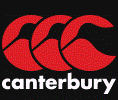
Us v Them: the story so far...
This content originally appeared in the MyBLACKCAPS Inside Edge newsletter.
Want more stories like this? If you’re not already a member, then join MyBLACKCAPS today for the Inside Edge newsletter, online video highlights, ticketing discounts, great offers and more!
For neighbours, New Zealand and Australia haven’t seen a lot of each other in One Day Internationals – at least not as much you’d expect. You’d have to go back to Cricket World Cup 2011, in Nagpur, for the last time they completed a match. It’s true, the two sides were supposed to play at Birmingham in the 2013 Champions Trophy but that game was washed-out. The last time the trans-Tasman rivals met in New Zealand? That would be March 13, 2010.
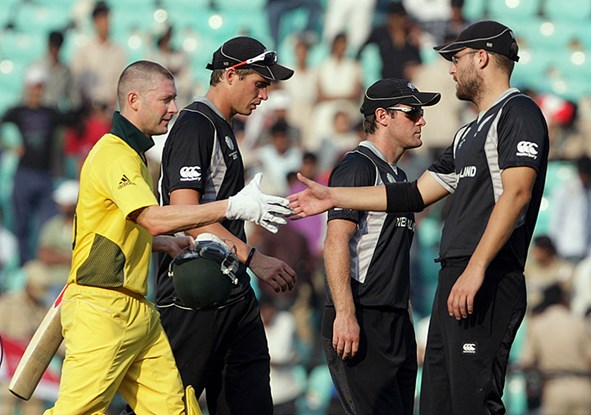
Dan Vettori was skipper the last time the trans Tasman team met in World Cups in 2011.
It’s one of the reasons the 20th match of the ICC Cricket World Cup 2015 – Australia v the BLACKCAPS at Eden Park, is generating so much interest. There's an air of mystery surrounding the encounter, generated in no small part by the fact the teams simply haven’t played each other for so long. Aussie have been outstanding but haven’t played New Zealand for four years. The BLACKCAPS are going gang-busters - but haven’t played Australia.
When it comes to the Cricket World Cup, Australia have enjoyed an advantage over New Zealand, winning six of the eight tournament matches played so far. That’s to be expected of a side which has won the coveted trophy on four previous occasions, including consecutively in 1999, 2003 and 2007. Put that alongside their current No.1 ranking in ODIs, and Australia will start the Eden Park match as favourites. Having said that, the BLACKCAPS are no-one’s underdogs.
Let’s have a look at what’s happened when these sides have collided previously in the Cricket World Cup.
1987: The first Cricket World Cup played outside Britain; the first with 50 (rather than 60 overs) and the last with white clothing. It was also the first time New Zealand and Australia met in a CWC. The trans-Tasman encounter was played at Nehru Stadium, Indore, in a reduced 30-over format on the reserve day, after heavy rain the day before. David Boon, Dean Jones and Allan Border led their side to 199 and, in reply, New Zealand ended an agonising three runs short - at 196 for nine. At one stage, New Zealand were 133 for two but lost seven for 63 at the pointy end of the chase. Alarmingly, Ewen Chatfield batted at No.10.
1987: Nine days later New Zealand and Australia met again at the whimsically-named Sector 16 Stadium in Chandigarh. On this occasion the Australians posted 251 for eight courtesy of a century from Geoff Marsh and a half-century from Dean Jones. New Zealand opened the batting with Martin Snedden and John Wright and the pair put on 72 for the first wicket. Ken Rutherford chimed in but, in the absence of either a truly significant individual score or consistent runs through the order, New Zealand were bowled out 17 runs short.
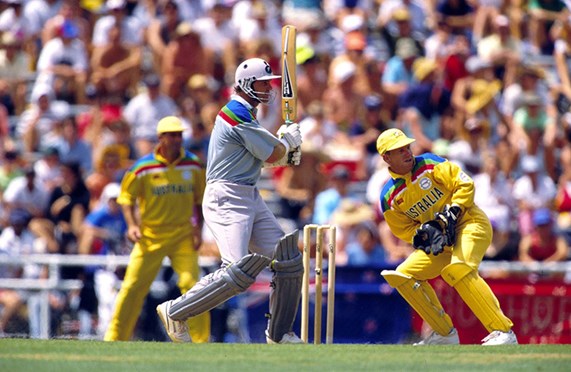
Martin Crowe was at his imperious best in 1992.
1992: The first Cricket World Cup to visit Australia and New Zealand; the first tournament to be played in coloured uniforms and the first to include South Africa, following their re-admittance to the ICC a year earlier. New Zealand hosted Australia in the tournament opener at Eden Park and stunned everyone with a 37-run win. Martin Crowe scored an unbeaten century and Rutherford 57 as the home side finished at 248 for six. Then New Zealand’s slow bowlers strangled the life out of the Australian reply – Dipak Patel, Chris Harris, Gavin Larsen and Rod Latham leading the way. Harris’ direct hit run out of Boon, the seventh wicket to fall at 200, was pivotal.
1996: The start of the security era for the Cricket World Cup. Played in India, Pakistan and Sri Lanka. Australia and the West Indies refused to travel to Sri Lanka for security reasons, forfeiting their results and effectively allowing Sri Lanka to qualify for the quarter-finals without playing a game. New Zealand met Australia at Chennai in the fourth quarter final and scampered to 286, thanks to 130 from Harris and 89 from Lee Germon; the pair adding 168 for the fourth wicket. Australia were impressive in their reply; Mark Waugh scoring a century and his brother Steve an unbeaten half-century as they won by six wickets with more than two overs remaining. Australia would progress to the final at Gaddafi Stadium, Lahore - only to be beaten by Sri Lanka.
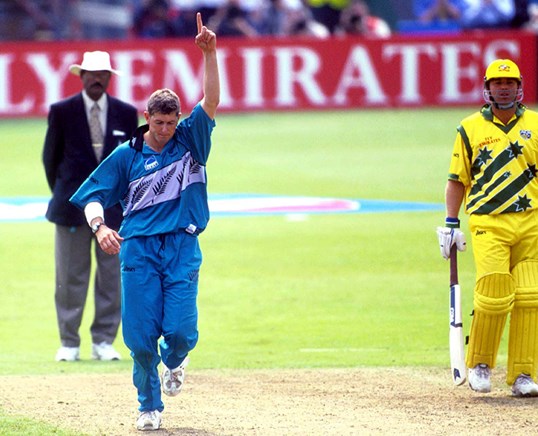
Geoff Allot wrecked havoc in Cardiff in 1999.
1999: Things hadn’t really improved, security-wise. When India played Pakistan their countries were officially at war. The 1999 tournament is remembered for the introduction of the Super Sixes phase, and the use of a white Dukes ball, which received controversial reviews. New Zealand left-arm paceman Geoff Allot seemed to like it. He cut a swathe through the opposition on his way to taking 20 wickets, a tournament record eventually equalled during the final by Shane Warne. New Zealand played Australia at Sophia Gardens, Cardiff, and beat them by five wickets with more than four overs to spare. Roger Twose (80*) and Chris Cairns (60) led New Zealand to its target of 213 but it was the effort of Allot which set up the win; his four for 37 reducing Australia’s innings to manageable proportions. Australia would win its second title, beating Pakistan in the final at Lord’s.
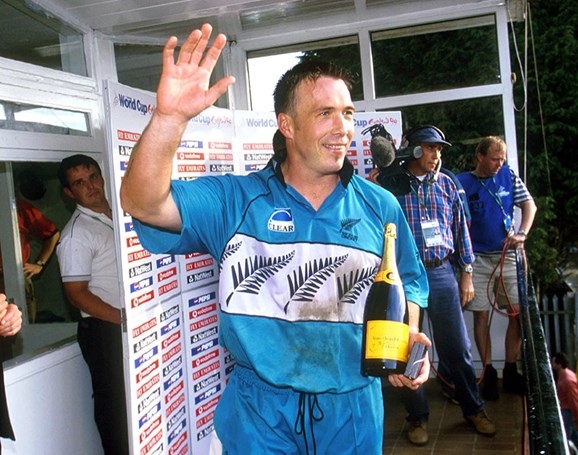
Man Of The Match Roger Twose collects the rewards in Cardiff.
2003: The first Cricket World Cup to be played in Africa. England’s decision against playing in Zimbabwe meant they didn’t qualify for the second round and New Zealand’s decision against travelling to Nairobi saw Kenya qualify for the semi-finals, probably at their expense. The trans-Tasman showdown arrived at Port Elizabeth when Australia were stunned by a remarkable spell of bowling from Shane Bond (six for 23) and bowled out for 208. At 85 for seven it might have been even worse but Michael Bevan and Andy Bichel took advantage of Stephen Fleming’s decision to bowl Bond out and added 97 for the eighth wicket. New Zealand crumbled in reply; dismissed for 112 in the 31st over. Australia would continue on to defend their title, decisively beating India in the final.
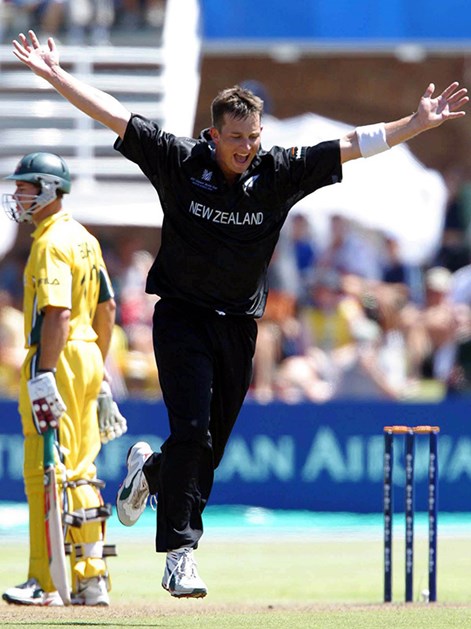
Shane Bond was near unplayable v Australia in 2003.
2007: The Caribbean hosted its first Cricket World Cup. Australia would win this one too, its third in succession, after beating Sri Lanka in the final in near darkness in Barbados. Earlier in the tournament they came up against the BLACKCAPS at St George’s, Grenada, and scored 348 for six on the way towards a comprehensive 215-run win. Matthew Hayden, Ricky Ponting, Shane Watson and Michael Clarke were amongst the runs as New Zealand’s bowlers wilted against the onslaught. Michael Mason and James Franklin went for nines an over; Mark Gillespie for elevens. In reply, New Zealand could not keep up with the asking rate and lost wickets quickly, eventually slumping to 133 all out in just the 26th over. Peter Fulton top-scored with 62.
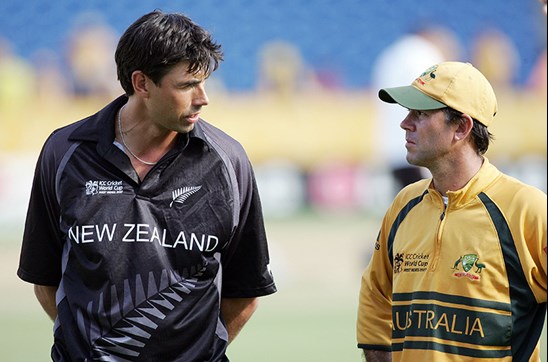
Stephen Fleming and Ricky Ponting compare notes before the 2007 encounter in the West Indies.
2011: The Cricket World Cup returned to Asia, this time hosted by India, Sri Lanka and Bangladesh. India beat Sri Lanka in the showpiece at Mumbai, becoming the first side to win the final on home soil. Australia and New Zealand met at Nagpur, where the BLACKCAPS found themselves in dire straits at 73 for six before clawing their way to partial respectability through the lower-order deeds of Nathan McCullum (52) and Daniel Vettori (44). Still, the total of 206 would not in the least trouble Australia, who romped to a seven wicket win in a mere 34 overs, led by Watson (62) and Brad Haddin (55). Australia’s stranglehold on the tournament would not last, however; the defending champions beaten in the quarter-finals by India.
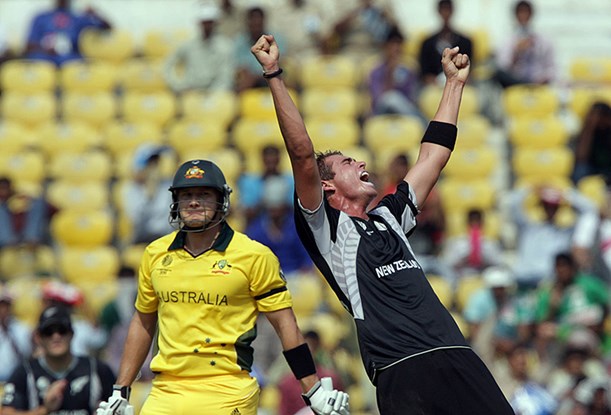
Tim Southee celebrates a wicket in Nagpur in 2011.
)





